Unit 10 Grammar Focus课件(人教版八年级下)
文档属性
| 名称 | Unit 10 Grammar Focus课件(人教版八年级下) |  | |
| 格式 | ppt | ||
| 文件大小 | 742.0KB | ||
| 资源类型 | 试卷 | ||
| 版本资源 | 人教新目标(Go for it)版 | ||
| 科目 | 英语 | ||
| 更新时间 | 2023-03-01 17:47:42 | ||
图片预览

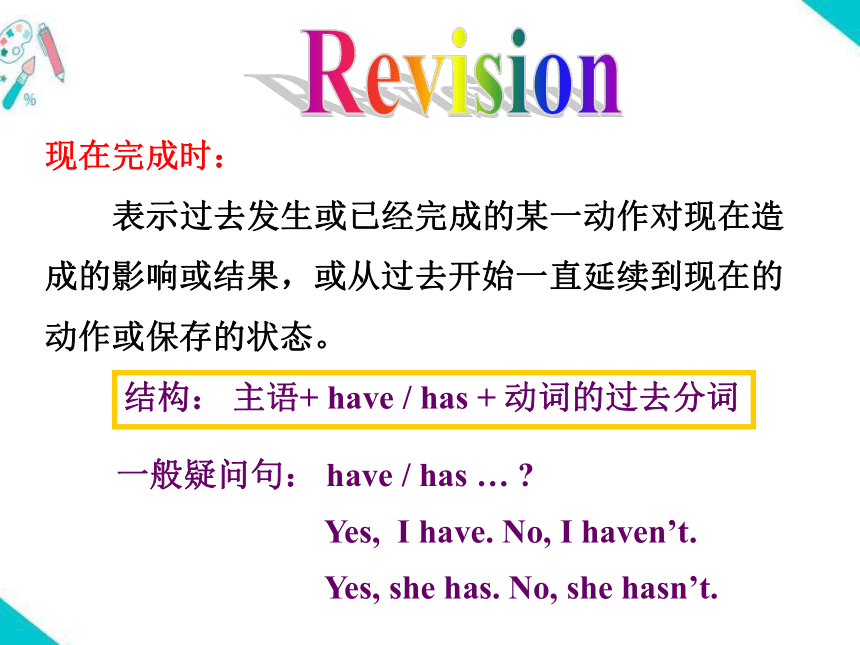
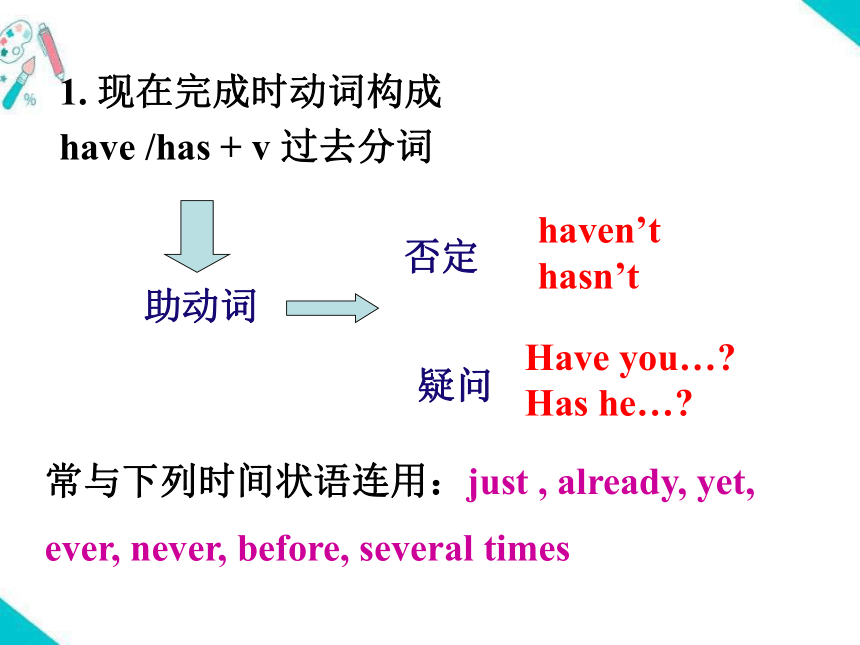
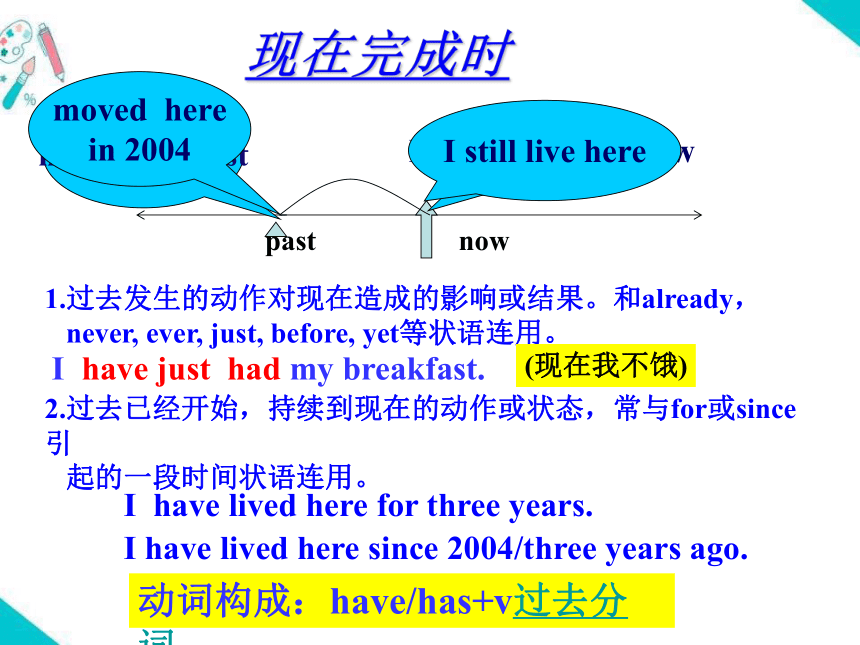
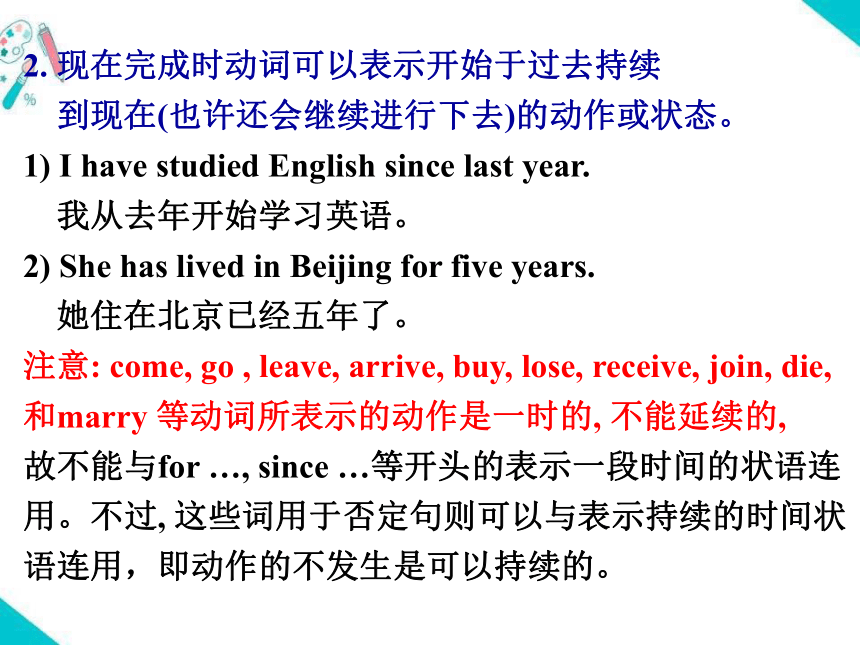

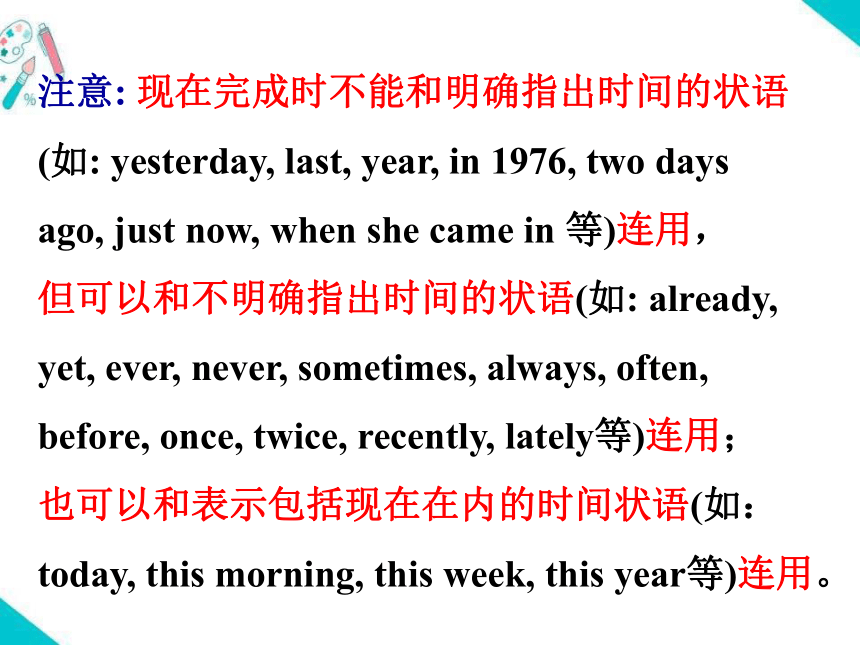
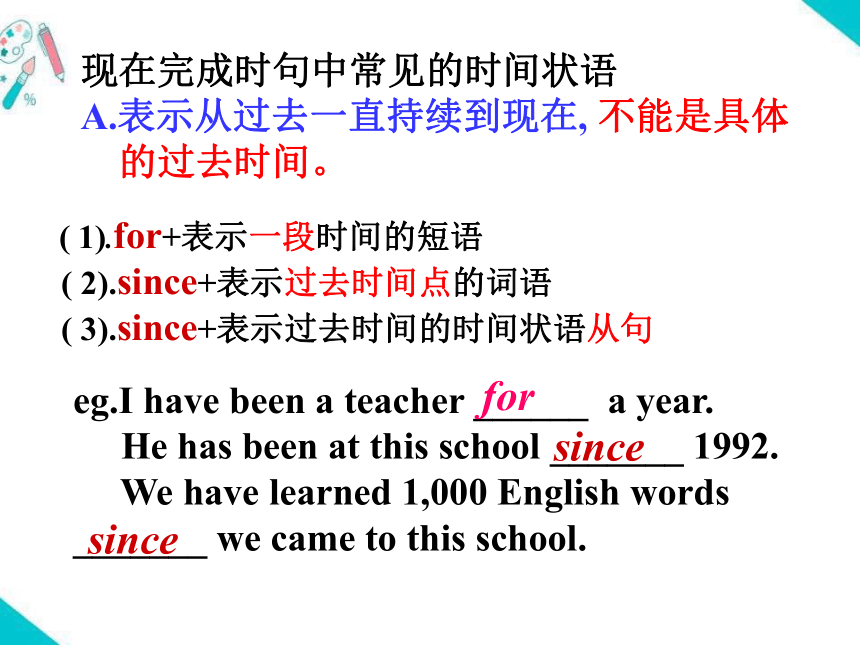
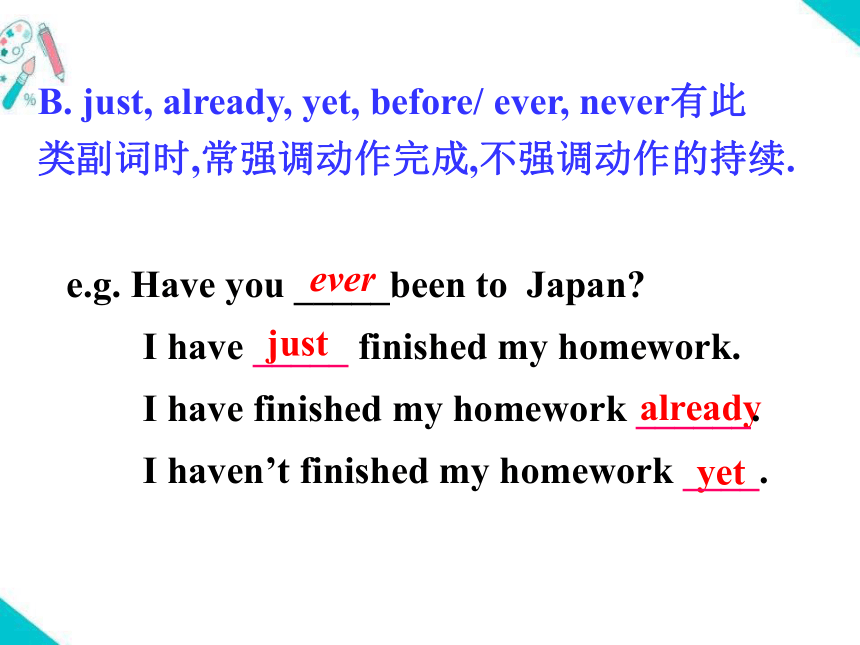
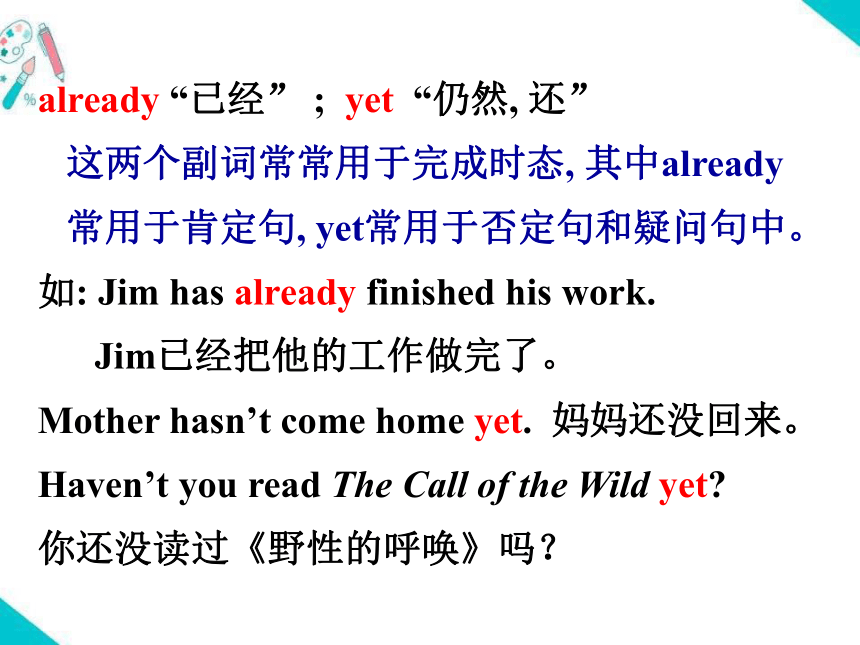
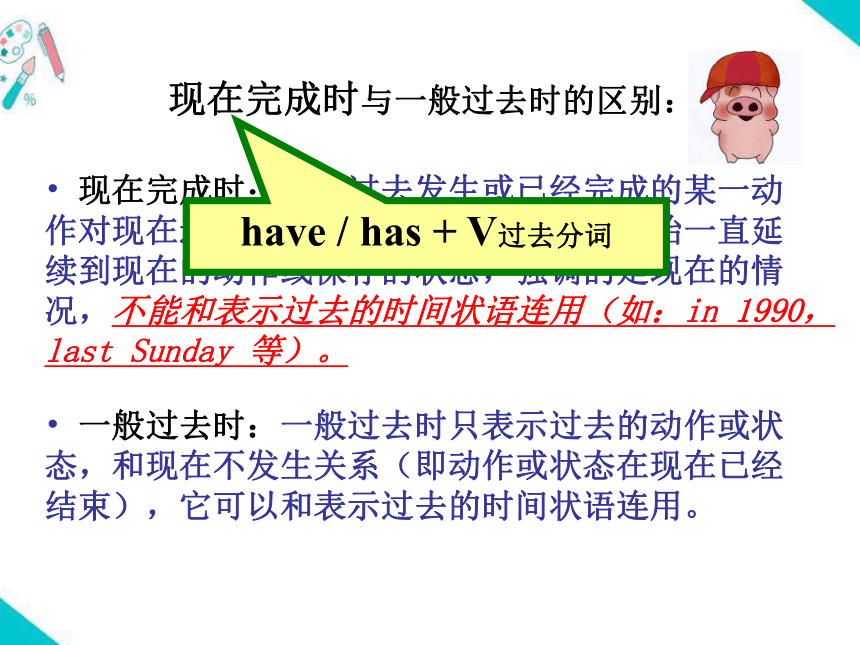
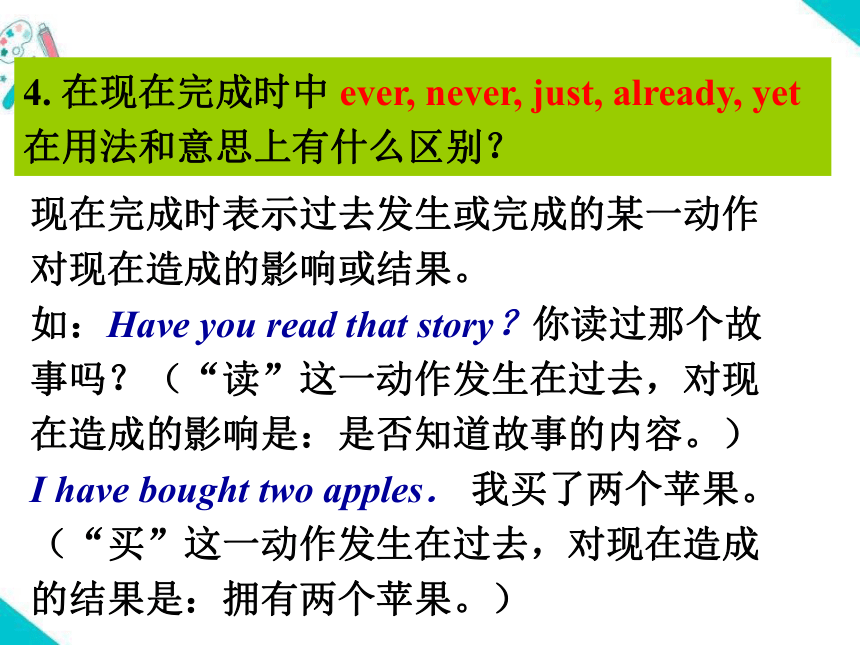
文档简介
(共57张PPT)
Unit 10
Grammar Focus
现在完成时:
表示过去发生或已经完成的某一动作对现在造成的影响或结果,或从过去开始一直延续到现在的动作或保存的状态。
结构: 主语+ have / has + 动词的过去分词
一般疑问句: have / has …
Yes, I have. No, I haven’t.
Yes, she has. No, she hasn’t.
1. 现在完成时动词构成
have /has + v 过去分词
助动词
否定
haven’t
hasn’t
疑问
Have you…
Has he…
常与下列时间状语连用:just , already, yet,
ever, never, before, several times
现在完成时
1.过去发生的动作对现在造成的影响或结果。和already,
never, ever, just, before, yet等状语连用。
2.过去已经开始,持续到现在的动作或状态,常与for或since引
起的一段时间状语连用。
动词构成:have/has+v过去分词
have breakfast
I have just had my breakfast.
(现在我不饿)
I’m not hungry now
moved here
in 2004
I still live here
I have lived here for three years.
I have lived here since 2004/three years ago.
now
past
2. 现在完成时动词可以表示开始于过去持续
到现在(也许还会继续进行下去)的动作或状态。
1) I have studied English since last year.
我从去年开始学习英语。
2) She has lived in Beijing for five years.
她住在北京已经五年了。
注意: come, go , leave, arrive, buy, lose, receive, join, die,
和marry 等动词所表示的动作是一时的, 不能延续的,
故不能与for …, since …等开头的表示一段时间的状语连
用。不过, 这些词用于否定句则可以与表示持续的时间状
语连用,即动作的不发生是可以持续的。
3. 现在完成时把过去的动作和现在的结果联系起来,
一般过去时只限于表示过去的动作本身, 与现在
的结果无关。现在完成时与一般过去时在意义上
的区别举例如下:
I have cleaned my room. (My room is clean now.)
我已经打扫过我的房间了。
I cleaned my room last week. (I did it in the past.)
我上周打扫了我的房间。
They have bought a dictionary. (They bought
a dictionary and they have it now.)
他们买了一本字典。
注意: 现在完成时不能和明确指出时间的状语
(如: yesterday, last, year, in 1976, two days
ago, just now, when she came in 等)连用,
但可以和不明确指出时间的状语(如: already,
yet, ever, never, sometimes, always, often,
before, once, twice, recently, lately等)连用;
也可以和表示包括现在在内的时间状语(如:
today, this morning, this week, this year等)连用。
( 1).for+表示一段时间的短语
( 2).since+表示过去时间点的词语
( 3).since+表示过去时间的时间状语从句
eg.I have been a teacher ______ a year.
He has been at this school _______ 1992.
We have learned 1,000 English words _______ we came to this school.
for
since
since
现在完成时句中常见的时间状语
A.表示从过去一直持续到现在, 不能是具体
的过去时间。
ever
just
already
yet
e.g. Have you _____been to Japan
I have _____ finished my homework.
I have finished my homework ______.
I haven’t finished my homework ____.
B. just, already, yet, before/ ever, never有此
类副词时,常强调动作完成,不强调动作的持续.
already “已经” ; yet “仍然, 还”
这两个副词常常用于完成时态, 其中already
常用于肯定句, yet常用于否定句和疑问句中。
如: Jim has already finished his work.
Jim已经把他的工作做完了。
Mother hasn’t come home yet. 妈妈还没回来。
Haven’t you read The Call of the Wild yet
你还没读过《野性的呼唤》吗?
现在完成时:表示过去发生或已经完成的某一动作对现在造成的影响或结果,或从过去开始一直延续到现在的动作或保存的状态,强调的是现在的情况,不能和表示过去的时间状语连用(如:in 1990,last Sunday 等)。
一般过去时:一般过去时只表示过去的动作或状态,和现在不发生关系(即动作或状态在现在已经结束),它可以和表示过去的时间状语连用。
现在完成时与一般过去时的区别:
have / has + V过去分词
现在完成时表示过去发生或完成的某一动作对现在造成的影响或结果。
如:Have you read that story?你读过那个故事吗?(“读”这一动作发生在过去,对现在造成的影响是:是否知道故事的内容。)
I have bought two apples. 我买了两个苹果。 (“买”这一动作发生在过去,对现在造成的结果是:拥有两个苹果。)
4. 在现在完成时中 ever, never, just, already, yet在用法和意思上有什么区别?
在学习这一概念的同时,还应注意常与现在完成时连用的几个副词:already, just, ever, yet, never等。already, just多用于肯定句中,ever, yet, never多用于疑问句和否定句中。
I have already finished my homework.
我已经做完家庭作业了。
He has just had his meal.他刚吃过饭。
Have you ever sung this English song?
你曾唱过这首英文歌吗?
They haven’t started yet. 他们还没有身。
We have never heard of it.
我们从来没有听说过这件事。
(1). Have (has) been in 意为“已经在某地呆了多长时间”,常与表示一段时间的状语连用。
Mr. Brown has been in Shanghai for three days. 布朗先生来上海已经有三天了。
They have been in Canada for five years.
他们到加拿大有五年了。
5. have been in, have been to 与have gone to
的用法
(2). Have (has) been to 意为“曾经去过某地”,表示现在已经不在那里了。可与 just, ever,
never 等连用。
I’ve just been to the post office.
我刚才去邮局了。
Have you ever been to Hangzhou
你曾经去过杭州吗?
Mary has never been to the Great Wall.
玛丽从未去过长城。
(3). Have (has) been to 后面可接次数,
表示去过某地几次。
如:I've been to Beijing three times.
我去过北京三次。
They have been to that village several times.
他们去过那个村庄好几次了。
(4). Have (has) gone to 意为“到某地去了”,表示到了某地或正在去某地的途中。总之,说话时该人不在现场,一般不用第一、二人称代词作主语。
如: —Where is Tom 汤姆在哪里?
—He has gone to the bookshop. 他到书店去了。
例如:
He has gone to Hong Kong.
他到香港去了。(他已前往香港, 或在途中,
或已到达。说话人暗示他现在不在现场)
He has been to Hong Kong. 他曾到过香港。
(说话人认为他过去到过香港, 现在已不在该地。
言外之意他对香港有所了解)
for 和 since 在现在完成时中的应用
for与since都能与现在完成时连用,但区别较大:
(1)for后须接“时间段”
He has studied English for five years.
他学英语5年了。
(2)since后须接“时间点”
He has studied English since 1999.
他从1999年开始学英语。
(3)二者可以转换
for + 一段时间 = since + 一段时间 + ago
He has been here for five weeks.
= He has been here since five weeks ago.
他到这儿已经有五个星期了。
如:
He has taught here since he came to China.
自从他来到中国就在这儿教书。
We have been friends since we met in school.
我们从在学校见面起就成为了好朋友。
(4) since能引导时间状语从句(主句用现在完成时,从句用一般过去时),而for则不能。
(5)现在完成时常用句型:
①It is (has been) +时间段+ since +时间状语或从句
It is four days since last Friday.
从上周五到现在已经四天了。
It has been two years since Jim came to Beijing.
吉姆来北京已经两年了。
②This is the first (second…) time that + 从句
句型中的that从句通常使用现在完成时。
如:
This is the first time that Jenny and Danny have been to China.
这是珍妮和丹妮第一次来屮国。
This is the third time that I have seen Karen.
这是我第三次见到Karen。
(6)均须与延续性动词连用,也可以与非延
续性动词的否定式连用。
如:
I have bought this computer since four years
ago. (×)
I have had this computer since four years ago. (√)
I haven’t bought anything for two months.(√ )
I haven't heard from him for 3 weeks. (√)
非延续性动词和延续性动词的转换
leave — be away borrow — keep
buy — have begin/start — be on
die — be dead finish --- be over
get up—be up, come here — be here,
join — be on +组织机构/be a member 组织机构,
go there — be there become — be,
come back—be back fall asleep — be asleep,
get to/ arrive/reach — be (in),
leave — be away from, get to know — know
go (get) out —tie out, put on—wear,
catch a cold —have a cold
get married—be married fall ill — be ill
The old man died 4 years ago.
— The old man has been dead for 4 years.
It is 4 years since the old man died.
—Four years has passed since the old man died.
He joined the Party 2 years ago.
—He has been in the Party for 2 years.
I bought the book 5 days ago.
—I have had the book for 5 days.
如:
(7)二者引出的时间状语往往用 how long提问。
—How long have you had this book
这本书你买多久了
—For a week./Since a week ago.
买一周了。
4a
Rewrite the sentences using for or since.
1. Jim is in Japan. He arrived there three days ago.
2. They are very hungry. Their last meal was ten hours ago.
3. I have a camera. I bought it in 2009.
Jim has been in Japan for three days.
They have not eaten for ten hours.
I have had a camera since 2009.
P76
4. I know Ann. I first met her three years ago.
5. Linda is ill. She became ill on Monday.
I have known Anna for three years.
Linda has been ill since Monday.
4b
Fill in the blanks with the correct forms of the verbs in brackets.
1. I ____________ (never be) to the water park before. I want to _______(go) next month before the weather gets too cold.
2. They ______________ (never own) any pets, but they ________________ (always want) to have a dog.
have never been
go
have never owned
have always wanted
P76
3. We ________ (have) a piano since last November. We ________ (buy) it from the Li family when they moved to the US last year.
4. Cathy and Amy ________________ (not be) back to their hometown for two years. They _____ (miss) their hometown a lot and hope to visit the place next year.
have had
have not been/haven’t been
bought
miss
5. This museum ________ (be) here for over 20 years. It _______ (be) one of the oldest buildings in this small town.
has been
is
4c
Fill in the questions and ask two students. Then complete the chart.
Do you have a(n) ________ How
long have you had it
2. Do you own a(n) ________ How long have you owned it
P76
Things How long
Tony favorite book
basketball for two years
since he was 10 years old
Student 1
Student 2
He _______ his hometown for twenty years. He really misses it!
A. has been away from B. left
C. has left D. is away from
【解析】A
考查动词的时态。从“for+一段时间”时间状语可知用现在完成时,因此,只能选择A或C选项;而leave是瞬间性动词,不能持续一段时间,所以要将leave变成be away from,故选A答案。
( ) I ______ Mr. Smith since he moved to Shanghai.
A. didn’t hear from B. don’t hear from
C. won’t hear from D. haven’t heard from
D
( ) Not only Jam but also his parents _______ a few interesting places since they came to China.
A. will visit B. has visited
C. have visited D. visited
C
( )—Excuse me, where is Mr. Brown's office
—Sorry, I don’t know. I _____ here for only a few days.
A. work B. worked
C. have worked D. will work
C
( ) My grandmother ______ a lot of changes in Tianjin since she came here.
A. sees B. can see
C. will see D. has seen
D
( ) I _______ many new friends since I came here.
A. make B. made
C. will make D. have made
D
( ) My aunt is a writer. She _____ more than ten books since 1980.
A. writes B. wrote
C. has written D. will write
C
( ) Premier Zhou Enlai _____ for many years, he still lives in the hearts of Chinese people.
A. died B. was died
C. has been died D. has been dead
D
( ) I _____ scared of dogs ever since a dog hurt me when I was five years old.
A. will be B. was
C. have been D. would be
C
( ) — Do you know Diaoyu Island —Sure. It ______ China since ancient times. A. belongs to B. belonged to
C. has belonged to D. is belonging to
C
( ) He _____ in this factory for 20 years already. A. will work B. works
C. has worked D. is working
C
【2020 北京】 We _____ each other since I came to Beijing, but we send emails very often.
A. don’t see B. didn’t see
C. won’t see D. haven’t seen
【解析】句意:自从我来北京,我们就没见过面,但我们经常发电子邮件。本题考查时态。don’t see是一般现在时;didn’ t see是一般过去时; won’t see是一般将来时;haven’t seen是现在完成时。根据since I came to Being可知,此处用现在完成时,故选D。
中考链接
D
【2020 贵州安顺】 Since 1990, Project Hope ______ millions of students from poor families realize their dreams.
A. will help B. has helped
C. helps
【解析】句意:自1990年以来,希望工程帮助了数百万贫困家庭的学生实现了他们的梦想。考查动词时态。will help一般将来时;has helped现在完成时;helps一般现在时。根据时间状语since 1990,可知该句应用现在完成时have / has done,再结合主语是Project Hope故谓语用单数,故选B。
B
【2020黑龙江省龙东地区】It has been two months since my father ______ for Italy.
A. was left B. left C. leaves
【解析】句意:我父亲去意大利已经两个月了。考查时态。was left被留下,一般过去时的被
动语态; left离开, leave的一般过去式; leaves离开,一般现在时,在since引导时间状语从句中,主句用现在完成时,从句一般过去时。而“was left被留下”不符合句意,所以排除
A。根据句意,可知“我父亲去意大利已经两个月了”,即从过去离开时到现在已经两个月
了,所以从句用过去时,故选B。
B
【2020四川成都】Bob, you ______ in this city since 2018. How do you like it
A. lived B. live
C. have lived
【解析】句意:鲍勃,你从2018年起就住在这个城市了。你觉得这座城市怎么样?考查现在
完成时。lived一般过去时;live一般现在时; have lived现在完成时。分析句子可知,此处表
示“你从2018年起就住在这个城市了”,强调时间的延续,构成“现在完成时+since+一般
过去时”,所以此处使用现在完成时。故选C。
C
【2020四川凉山州】 — It's 20 years since we came back to Liangshan.
— How time flies! We ______ in our hometown for such a long time.
A. work B. worked
C. has worked D. have worked
【解析】句意:—我们回到凉山20年了。—时光飞逝!我们在家乡工作了这么长的时间。考查动词的时态。work动词的一般现在时的原形;worked动词的过去式;has worked动词的现在完成时,主语是第三人称单数;have worked动词的现在完成时态。主语we是复数;根据“for such a long time”可知强调动作的持续,用现在完成时have worked。故选D。
D
【2020四川达州】 — Clara, you have _____ Journey to the West for two weeks.
— Sorry, I wanted to give it back but was made
____ Dazhou on business last week.
A. borrowed; to leave B. kept; to leave
C. kept; leave D. borrowed; leave
B
【2020四川广元】— _______ has she been in Bejjing
— Since five years ago.
A. How far B. How soon
C. How long
C
【2020四川遂宁】— The new shirt looks good on you. When did you buy it
— On July 7th. I _____ it for a week.
A. have bought B. have had
C. bought D. buy
【2020江苏泰州】Some primary and secondary schools ______ winter sports to their courses since Beijing won the right to host the 2022 Winter Olympic Games.
A. added B. will add
C. have added D. were adding
B
C
(2019·江苏泰州)
—Have you ever been to Shanghai
—Of course. Actually, I _________there for six years but now I live in Taizhou.
A. worked B. was working
C. would work D. have worked
D
(2019·福建)
—Look !My mother _____ a new dress for me.
—Wow, it looks very nice on you.
A is making
B. has made
C. will make
B
(2018·上海)
The film Operation Red Sea _____ a lot of praise since its first show months ago.
A)wins B)win
C)will win D)has won
D
Practice
用括号内词的正确形式填空。
The old man ________(live) here since 1992.
_____ you _______(visit) our factory yet
I ___________ (not see) you for a long time. You _____________(change) a lot.
I’m afraid I __________(keep) you waiting for a long time.
He __________(know) the city since he was very young.
has lived
Have
visited
haven’t seen
have changed
have kept
has known
选用 for和 since填空:
1.We haven’t seen each other ______ a long time.
2.His father has been in the Party ______ 10 years ago.
3.The film has been on ______ 20 minutes.
for
since
for
4. Mr Green has worked here ______ he came to China.
5. His grandparents have been dead ______ several years.
6. It’s five years _______ we met last time.
since
for
since
用for或since完成下列句子。
1. Jill is in Ireland now. She arrived there three days ago.
She has been there for three days.
2. Jack is here. He arrived here on Tuesday.
He has ______________________________.
3. I know Sue. I first met Sue two years ago.
I’ve ___________________________________ ____________.
been here since Tuesday
known Sue since two years ago. / for two years
4. I have a camera. I bought it in 1989.
_________________________________.
5. Dave plays the piano. He started when he was seven years old.
__________________________________________________.
I have had the camera since 1989
Dave has played the piano since he was seven years old
1. They have been here since 2000. (对划线部分提问)
____________ have they been here
2. The old man _________ last year. He __________ for a year. (die) (动词填空)
3. This factory opened twenty years ago. (同义句转换)
This factory ______________ for twenty years.
How long
died
has been dead
has been open
按要求完成句子。
Unit 10
Grammar Focus
现在完成时:
表示过去发生或已经完成的某一动作对现在造成的影响或结果,或从过去开始一直延续到现在的动作或保存的状态。
结构: 主语+ have / has + 动词的过去分词
一般疑问句: have / has …
Yes, I have. No, I haven’t.
Yes, she has. No, she hasn’t.
1. 现在完成时动词构成
have /has + v 过去分词
助动词
否定
haven’t
hasn’t
疑问
Have you…
Has he…
常与下列时间状语连用:just , already, yet,
ever, never, before, several times
现在完成时
1.过去发生的动作对现在造成的影响或结果。和already,
never, ever, just, before, yet等状语连用。
2.过去已经开始,持续到现在的动作或状态,常与for或since引
起的一段时间状语连用。
动词构成:have/has+v过去分词
have breakfast
I have just had my breakfast.
(现在我不饿)
I’m not hungry now
moved here
in 2004
I still live here
I have lived here for three years.
I have lived here since 2004/three years ago.
now
past
2. 现在完成时动词可以表示开始于过去持续
到现在(也许还会继续进行下去)的动作或状态。
1) I have studied English since last year.
我从去年开始学习英语。
2) She has lived in Beijing for five years.
她住在北京已经五年了。
注意: come, go , leave, arrive, buy, lose, receive, join, die,
和marry 等动词所表示的动作是一时的, 不能延续的,
故不能与for …, since …等开头的表示一段时间的状语连
用。不过, 这些词用于否定句则可以与表示持续的时间状
语连用,即动作的不发生是可以持续的。
3. 现在完成时把过去的动作和现在的结果联系起来,
一般过去时只限于表示过去的动作本身, 与现在
的结果无关。现在完成时与一般过去时在意义上
的区别举例如下:
I have cleaned my room. (My room is clean now.)
我已经打扫过我的房间了。
I cleaned my room last week. (I did it in the past.)
我上周打扫了我的房间。
They have bought a dictionary. (They bought
a dictionary and they have it now.)
他们买了一本字典。
注意: 现在完成时不能和明确指出时间的状语
(如: yesterday, last, year, in 1976, two days
ago, just now, when she came in 等)连用,
但可以和不明确指出时间的状语(如: already,
yet, ever, never, sometimes, always, often,
before, once, twice, recently, lately等)连用;
也可以和表示包括现在在内的时间状语(如:
today, this morning, this week, this year等)连用。
( 1).for+表示一段时间的短语
( 2).since+表示过去时间点的词语
( 3).since+表示过去时间的时间状语从句
eg.I have been a teacher ______ a year.
He has been at this school _______ 1992.
We have learned 1,000 English words _______ we came to this school.
for
since
since
现在完成时句中常见的时间状语
A.表示从过去一直持续到现在, 不能是具体
的过去时间。
ever
just
already
yet
e.g. Have you _____been to Japan
I have _____ finished my homework.
I have finished my homework ______.
I haven’t finished my homework ____.
B. just, already, yet, before/ ever, never有此
类副词时,常强调动作完成,不强调动作的持续.
already “已经” ; yet “仍然, 还”
这两个副词常常用于完成时态, 其中already
常用于肯定句, yet常用于否定句和疑问句中。
如: Jim has already finished his work.
Jim已经把他的工作做完了。
Mother hasn’t come home yet. 妈妈还没回来。
Haven’t you read The Call of the Wild yet
你还没读过《野性的呼唤》吗?
现在完成时:表示过去发生或已经完成的某一动作对现在造成的影响或结果,或从过去开始一直延续到现在的动作或保存的状态,强调的是现在的情况,不能和表示过去的时间状语连用(如:in 1990,last Sunday 等)。
一般过去时:一般过去时只表示过去的动作或状态,和现在不发生关系(即动作或状态在现在已经结束),它可以和表示过去的时间状语连用。
现在完成时与一般过去时的区别:
have / has + V过去分词
现在完成时表示过去发生或完成的某一动作对现在造成的影响或结果。
如:Have you read that story?你读过那个故事吗?(“读”这一动作发生在过去,对现在造成的影响是:是否知道故事的内容。)
I have bought two apples. 我买了两个苹果。 (“买”这一动作发生在过去,对现在造成的结果是:拥有两个苹果。)
4. 在现在完成时中 ever, never, just, already, yet在用法和意思上有什么区别?
在学习这一概念的同时,还应注意常与现在完成时连用的几个副词:already, just, ever, yet, never等。already, just多用于肯定句中,ever, yet, never多用于疑问句和否定句中。
I have already finished my homework.
我已经做完家庭作业了。
He has just had his meal.他刚吃过饭。
Have you ever sung this English song?
你曾唱过这首英文歌吗?
They haven’t started yet. 他们还没有身。
We have never heard of it.
我们从来没有听说过这件事。
(1). Have (has) been in 意为“已经在某地呆了多长时间”,常与表示一段时间的状语连用。
Mr. Brown has been in Shanghai for three days. 布朗先生来上海已经有三天了。
They have been in Canada for five years.
他们到加拿大有五年了。
5. have been in, have been to 与have gone to
的用法
(2). Have (has) been to 意为“曾经去过某地”,表示现在已经不在那里了。可与 just, ever,
never 等连用。
I’ve just been to the post office.
我刚才去邮局了。
Have you ever been to Hangzhou
你曾经去过杭州吗?
Mary has never been to the Great Wall.
玛丽从未去过长城。
(3). Have (has) been to 后面可接次数,
表示去过某地几次。
如:I've been to Beijing three times.
我去过北京三次。
They have been to that village several times.
他们去过那个村庄好几次了。
(4). Have (has) gone to 意为“到某地去了”,表示到了某地或正在去某地的途中。总之,说话时该人不在现场,一般不用第一、二人称代词作主语。
如: —Where is Tom 汤姆在哪里?
—He has gone to the bookshop. 他到书店去了。
例如:
He has gone to Hong Kong.
他到香港去了。(他已前往香港, 或在途中,
或已到达。说话人暗示他现在不在现场)
He has been to Hong Kong. 他曾到过香港。
(说话人认为他过去到过香港, 现在已不在该地。
言外之意他对香港有所了解)
for 和 since 在现在完成时中的应用
for与since都能与现在完成时连用,但区别较大:
(1)for后须接“时间段”
He has studied English for five years.
他学英语5年了。
(2)since后须接“时间点”
He has studied English since 1999.
他从1999年开始学英语。
(3)二者可以转换
for + 一段时间 = since + 一段时间 + ago
He has been here for five weeks.
= He has been here since five weeks ago.
他到这儿已经有五个星期了。
如:
He has taught here since he came to China.
自从他来到中国就在这儿教书。
We have been friends since we met in school.
我们从在学校见面起就成为了好朋友。
(4) since能引导时间状语从句(主句用现在完成时,从句用一般过去时),而for则不能。
(5)现在完成时常用句型:
①It is (has been) +时间段+ since +时间状语或从句
It is four days since last Friday.
从上周五到现在已经四天了。
It has been two years since Jim came to Beijing.
吉姆来北京已经两年了。
②This is the first (second…) time that + 从句
句型中的that从句通常使用现在完成时。
如:
This is the first time that Jenny and Danny have been to China.
这是珍妮和丹妮第一次来屮国。
This is the third time that I have seen Karen.
这是我第三次见到Karen。
(6)均须与延续性动词连用,也可以与非延
续性动词的否定式连用。
如:
I have bought this computer since four years
ago. (×)
I have had this computer since four years ago. (√)
I haven’t bought anything for two months.(√ )
I haven't heard from him for 3 weeks. (√)
非延续性动词和延续性动词的转换
leave — be away borrow — keep
buy — have begin/start — be on
die — be dead finish --- be over
get up—be up, come here — be here,
join — be on +组织机构/be a member 组织机构,
go there — be there become — be,
come back—be back fall asleep — be asleep,
get to/ arrive/reach — be (in),
leave — be away from, get to know — know
go (get) out —tie out, put on—wear,
catch a cold —have a cold
get married—be married fall ill — be ill
The old man died 4 years ago.
— The old man has been dead for 4 years.
It is 4 years since the old man died.
—Four years has passed since the old man died.
He joined the Party 2 years ago.
—He has been in the Party for 2 years.
I bought the book 5 days ago.
—I have had the book for 5 days.
如:
(7)二者引出的时间状语往往用 how long提问。
—How long have you had this book
这本书你买多久了
—For a week./Since a week ago.
买一周了。
4a
Rewrite the sentences using for or since.
1. Jim is in Japan. He arrived there three days ago.
2. They are very hungry. Their last meal was ten hours ago.
3. I have a camera. I bought it in 2009.
Jim has been in Japan for three days.
They have not eaten for ten hours.
I have had a camera since 2009.
P76
4. I know Ann. I first met her three years ago.
5. Linda is ill. She became ill on Monday.
I have known Anna for three years.
Linda has been ill since Monday.
4b
Fill in the blanks with the correct forms of the verbs in brackets.
1. I ____________ (never be) to the water park before. I want to _______(go) next month before the weather gets too cold.
2. They ______________ (never own) any pets, but they ________________ (always want) to have a dog.
have never been
go
have never owned
have always wanted
P76
3. We ________ (have) a piano since last November. We ________ (buy) it from the Li family when they moved to the US last year.
4. Cathy and Amy ________________ (not be) back to their hometown for two years. They _____ (miss) their hometown a lot and hope to visit the place next year.
have had
have not been/haven’t been
bought
miss
5. This museum ________ (be) here for over 20 years. It _______ (be) one of the oldest buildings in this small town.
has been
is
4c
Fill in the questions and ask two students. Then complete the chart.
Do you have a(n) ________ How
long have you had it
2. Do you own a(n) ________ How long have you owned it
P76
Things How long
Tony favorite book
basketball for two years
since he was 10 years old
Student 1
Student 2
He _______ his hometown for twenty years. He really misses it!
A. has been away from B. left
C. has left D. is away from
【解析】A
考查动词的时态。从“for+一段时间”时间状语可知用现在完成时,因此,只能选择A或C选项;而leave是瞬间性动词,不能持续一段时间,所以要将leave变成be away from,故选A答案。
( ) I ______ Mr. Smith since he moved to Shanghai.
A. didn’t hear from B. don’t hear from
C. won’t hear from D. haven’t heard from
D
( ) Not only Jam but also his parents _______ a few interesting places since they came to China.
A. will visit B. has visited
C. have visited D. visited
C
( )—Excuse me, where is Mr. Brown's office
—Sorry, I don’t know. I _____ here for only a few days.
A. work B. worked
C. have worked D. will work
C
( ) My grandmother ______ a lot of changes in Tianjin since she came here.
A. sees B. can see
C. will see D. has seen
D
( ) I _______ many new friends since I came here.
A. make B. made
C. will make D. have made
D
( ) My aunt is a writer. She _____ more than ten books since 1980.
A. writes B. wrote
C. has written D. will write
C
( ) Premier Zhou Enlai _____ for many years, he still lives in the hearts of Chinese people.
A. died B. was died
C. has been died D. has been dead
D
( ) I _____ scared of dogs ever since a dog hurt me when I was five years old.
A. will be B. was
C. have been D. would be
C
( ) — Do you know Diaoyu Island —Sure. It ______ China since ancient times. A. belongs to B. belonged to
C. has belonged to D. is belonging to
C
( ) He _____ in this factory for 20 years already. A. will work B. works
C. has worked D. is working
C
【2020 北京】 We _____ each other since I came to Beijing, but we send emails very often.
A. don’t see B. didn’t see
C. won’t see D. haven’t seen
【解析】句意:自从我来北京,我们就没见过面,但我们经常发电子邮件。本题考查时态。don’t see是一般现在时;didn’ t see是一般过去时; won’t see是一般将来时;haven’t seen是现在完成时。根据since I came to Being可知,此处用现在完成时,故选D。
中考链接
D
【2020 贵州安顺】 Since 1990, Project Hope ______ millions of students from poor families realize their dreams.
A. will help B. has helped
C. helps
【解析】句意:自1990年以来,希望工程帮助了数百万贫困家庭的学生实现了他们的梦想。考查动词时态。will help一般将来时;has helped现在完成时;helps一般现在时。根据时间状语since 1990,可知该句应用现在完成时have / has done,再结合主语是Project Hope故谓语用单数,故选B。
B
【2020黑龙江省龙东地区】It has been two months since my father ______ for Italy.
A. was left B. left C. leaves
【解析】句意:我父亲去意大利已经两个月了。考查时态。was left被留下,一般过去时的被
动语态; left离开, leave的一般过去式; leaves离开,一般现在时,在since引导时间状语从句中,主句用现在完成时,从句一般过去时。而“was left被留下”不符合句意,所以排除
A。根据句意,可知“我父亲去意大利已经两个月了”,即从过去离开时到现在已经两个月
了,所以从句用过去时,故选B。
B
【2020四川成都】Bob, you ______ in this city since 2018. How do you like it
A. lived B. live
C. have lived
【解析】句意:鲍勃,你从2018年起就住在这个城市了。你觉得这座城市怎么样?考查现在
完成时。lived一般过去时;live一般现在时; have lived现在完成时。分析句子可知,此处表
示“你从2018年起就住在这个城市了”,强调时间的延续,构成“现在完成时+since+一般
过去时”,所以此处使用现在完成时。故选C。
C
【2020四川凉山州】 — It's 20 years since we came back to Liangshan.
— How time flies! We ______ in our hometown for such a long time.
A. work B. worked
C. has worked D. have worked
【解析】句意:—我们回到凉山20年了。—时光飞逝!我们在家乡工作了这么长的时间。考查动词的时态。work动词的一般现在时的原形;worked动词的过去式;has worked动词的现在完成时,主语是第三人称单数;have worked动词的现在完成时态。主语we是复数;根据“for such a long time”可知强调动作的持续,用现在完成时have worked。故选D。
D
【2020四川达州】 — Clara, you have _____ Journey to the West for two weeks.
— Sorry, I wanted to give it back but was made
____ Dazhou on business last week.
A. borrowed; to leave B. kept; to leave
C. kept; leave D. borrowed; leave
B
【2020四川广元】— _______ has she been in Bejjing
— Since five years ago.
A. How far B. How soon
C. How long
C
【2020四川遂宁】— The new shirt looks good on you. When did you buy it
— On July 7th. I _____ it for a week.
A. have bought B. have had
C. bought D. buy
【2020江苏泰州】Some primary and secondary schools ______ winter sports to their courses since Beijing won the right to host the 2022 Winter Olympic Games.
A. added B. will add
C. have added D. were adding
B
C
(2019·江苏泰州)
—Have you ever been to Shanghai
—Of course. Actually, I _________there for six years but now I live in Taizhou.
A. worked B. was working
C. would work D. have worked
D
(2019·福建)
—Look !My mother _____ a new dress for me.
—Wow, it looks very nice on you.
A is making
B. has made
C. will make
B
(2018·上海)
The film Operation Red Sea _____ a lot of praise since its first show months ago.
A)wins B)win
C)will win D)has won
D
Practice
用括号内词的正确形式填空。
The old man ________(live) here since 1992.
_____ you _______(visit) our factory yet
I ___________ (not see) you for a long time. You _____________(change) a lot.
I’m afraid I __________(keep) you waiting for a long time.
He __________(know) the city since he was very young.
has lived
Have
visited
haven’t seen
have changed
have kept
has known
选用 for和 since填空:
1.We haven’t seen each other ______ a long time.
2.His father has been in the Party ______ 10 years ago.
3.The film has been on ______ 20 minutes.
for
since
for
4. Mr Green has worked here ______ he came to China.
5. His grandparents have been dead ______ several years.
6. It’s five years _______ we met last time.
since
for
since
用for或since完成下列句子。
1. Jill is in Ireland now. She arrived there three days ago.
She has been there for three days.
2. Jack is here. He arrived here on Tuesday.
He has ______________________________.
3. I know Sue. I first met Sue two years ago.
I’ve ___________________________________ ____________.
been here since Tuesday
known Sue since two years ago. / for two years
4. I have a camera. I bought it in 1989.
_________________________________.
5. Dave plays the piano. He started when he was seven years old.
__________________________________________________.
I have had the camera since 1989
Dave has played the piano since he was seven years old
1. They have been here since 2000. (对划线部分提问)
____________ have they been here
2. The old man _________ last year. He __________ for a year. (die) (动词填空)
3. This factory opened twenty years ago. (同义句转换)
This factory ______________ for twenty years.
How long
died
has been dead
has been open
按要求完成句子。
同课章节目录
- Unit 1 What's the matter?
- Section A
- Section B
- Unit 2 I'll help to clean up the city parks.
- Section A
- Section B
- Unit 3 Could you please clean your room?
- Section A
- Section B
- Unit 4 Why don't you talk to your parents?
- Section A
- Section B
- Unit 5 What were you doing when the rainstorm came
- Section A
- Section B
- Review of Units 1-5
- Unit 6 An old man tried to move the mountains.
- Section A
- Section B
- Unit 7 What's the highest mountain in the world?
- Section A
- Section B
- Unit 8 Have you read Treasure Island yet?
- Section A
- Section B
- Unit 9 Have you ever been to a museum?
- Section A
- Section B
- Unit 10 I've had this bike for three years.
- Section A
- Section B
